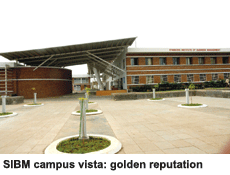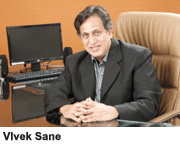Routinely ranked among the country’s top 25 B-schools, SIBM is a constituent institution of the Pune-based Symbiosis Group which comprises 35 institutions with 27,000 enroled students
 Ever since it was promoted in 1978 as the first postgraduate institute of business management studies in Maharashtra’s second (after Mumbai) most-industrial city of Pune (pop.6 million), the Symbiosis Institute of Business Management (SIBM) has steadily earned itself a golden reput-ation. In all national surveys of India’s most respected B-schools, SIBM is routinely ranked among the Top 25 countrywide. For instance in the latest Business Today-Nielsen survey of India’s 60 most respected B-schools (BT, October 3, 2010) SIBM is ranked 13. Likewise in the 2010 BusinessWorld survey, it is ranked 24 (BW, June 28, 2010).
Ever since it was promoted in 1978 as the first postgraduate institute of business management studies in Maharashtra’s second (after Mumbai) most-industrial city of Pune (pop.6 million), the Symbiosis Institute of Business Management (SIBM) has steadily earned itself a golden reput-ation. In all national surveys of India’s most respected B-schools, SIBM is routinely ranked among the Top 25 countrywide. For instance in the latest Business Today-Nielsen survey of India’s 60 most respected B-schools (BT, October 3, 2010) SIBM is ranked 13. Likewise in the 2010 BusinessWorld survey, it is ranked 24 (BW, June 28, 2010).
Currently this highly-rated B-school, which offers its full-time 24-month residential postgraduate diploma in business management; 30-month part-time executive MBA and a 12-month postgraduate diploma for working professionals and customised executive diploma programmes, has more than 500 including foreign, students from ten countries on its muster rolls. They are mentored and facilitated by 14 full-time faculty, two associate faculty, and seven international visiting faculty.
SIBM is a constituent institution of the Pune-based Symbiosis Group (estb. 1978) which comprises 35 academic institutions including Symbiosis Institute of Mass Communication, Symbiosis Institute of Telecom Management, Symbiosis Institute of Computer Studies and Research, spread across 20 campuses in and around Pune with an aggregate enrolment of over 27,000 Indian and foreign students and over 100,000 off-campus students. The Symbiosis Group of institutions was established by Dr. S.B. Mujumdar, former professor of botany at Pune’s Fergusson College who, anguished by the impolite and ill-mannered treatment of foreign — particularly African — students by Pune residents, promoted the Symbiosis (“organisms living together for mutual benefit”) Society in 1971.
Since then the society has flowered into the Symbiosis Group and Symbiosis International University (SIU), of which he is the incumbent chancellor. A fully-fledged university in its own right and accorded recognition as such by the Delhi-based University Grants Comm-ission and accredited by the National Assessment and Accreditation Council as a Grade A higher education institution, SIU boasts the faculties of law, business management, computer studies, health sciences, media, communication and design, humanities, and engineering and offers 87 undergrad and postgraduate degree and diploma certification programmes.
Spread over 300 acres on a hilltop at Lavale village on the periphery of Pune city, the SIU campus houses various trust offices, a central library, auditorium, conference hall, canteen, healthcare centre, area for recreational activities, shopping area, guest house, swimming pool, teaching and non-teaching staff housing, classrooms, etc. SIBM is sited within the SIU campus providing its students access to the university’s excellent academic and sports facilities. The institute’s library is stocked with 18,000 volumes, several journal subscriptions and electronic resources. The computer lab hosts 120 PCs and offers broadband internet and intranet connectivity.
 “The distinguishing characteristic of SIBM is our emphasis on achieving excellence in academics, inter-cultural solidarity and understanding of the world along with valuable contributions to industry, society and students. Over the past three decades we have been able to design, refine and innovate our business management study progra-mmes to mirror the needs of Indian industry. In particular there is huge emphasis on entrepreneurship, inno-vation and hands-on practical learning. Our industry-ready graduates are highly appreciated by India Inc. Last year our campus recruitment and placement programme attracted 127 corporates including Bharti Airtel, Ernst & Young, Godrej Industries, HDFC, Mahindra & Mahindra, Tata Sons, among other blue-chip companies who absorbed our entire batch of 180 graduates at an average salary of Rs.9.25 lakh per year with the highest domestic salary offered topping Rs.16.6 lakh and foreign salary package topping Rs.24 lakh,” says Dr. Vivek Sane, an alumnus of University of Pune who served as faculty with SIBM for 30 years before assuming charge as director in June last year.
“The distinguishing characteristic of SIBM is our emphasis on achieving excellence in academics, inter-cultural solidarity and understanding of the world along with valuable contributions to industry, society and students. Over the past three decades we have been able to design, refine and innovate our business management study progra-mmes to mirror the needs of Indian industry. In particular there is huge emphasis on entrepreneurship, inno-vation and hands-on practical learning. Our industry-ready graduates are highly appreciated by India Inc. Last year our campus recruitment and placement programme attracted 127 corporates including Bharti Airtel, Ernst & Young, Godrej Industries, HDFC, Mahindra & Mahindra, Tata Sons, among other blue-chip companies who absorbed our entire batch of 180 graduates at an average salary of Rs.9.25 lakh per year with the highest domestic salary offered topping Rs.16.6 lakh and foreign salary package topping Rs.24 lakh,” says Dr. Vivek Sane, an alumnus of University of Pune who served as faculty with SIBM for 30 years before assuming charge as director in June last year.
According to Sane, SIBM’s faculty is particularly proud of the interest it has aroused within the student community in start-ups and greenfield projects through its emphasis on entrepreneurship education. “We also take pains to encourage our students to grasp intrapreneurship — entrepreneurial opportunities within corporate organisations. Given the rising preference for self-employment in the new millennium, we have incor-porated entrepreneurship and intrapreneurship as compulsory subjects within the SIBM curriculum this year,” says Sane.
However life on the SIBM campus is not all work and no play. Extra-curricular and life skills education is also accorded considerable importance. B-Quizzed@ SIBM is the institute’s popular national-level business quiz competition designed to give B-school students countrywide opportunity to test their business knowledge and acumen. Alpaviram — Contemplating Vision 2020 is another co-curricular programme to enable students to “pause to take stock of the current situation and what needs to be done to achieve Vision 2020”. And Transcend is a three-day annual management and cultural fest which attracted more than 4,000 participants from top 40 B-schools in India last year.
Looking ahead into the future, Sane is confident that SIBM will cement its position among the Top 10 B-schools of India. “We have drawn up plans to increase the annual intake of students into our full-time 24-month programme within the next five years. Simultan-eously we will make our executive management programmes available in other cities and over the internet. With the Indian economy growing at over 8 percent per year and Indian industry experiencing a grave shortage of trained business and organisation management professionals, we are ready, willing and able to contribute a larger number of high-quality industry-ready business professionals to Indian industry and the economy” says Sane.
|
Admission & fees
Admission into the Symbiosis Institute of Business Management requires students to write the Symbiosis National Aptitude Test (SNAP) — the common entrance test for admission into all postgraduate programmes offered by Symbiosis International University. SNAP is conducted across 30 cities countrywide usually in end November every year.
Programmes. Residential MBA (24 months, Tuition fee: Rs.390,000); Executive MBA Weekend (30 months, Rs.350,000); PG Diploma Weekend (12 months, Rs.50,000)
For more information contact SIBM, Symbiosis Knowledge Village, Gram: Lavale via Sus Road, Tal: Mulshi, Pune 411 042; Tel: 91-020-39116000; e-mail: director@sibm.edu; www.sibm.edu.
|
Huned Contractor (Pune)